- Home
- ‘Our young people aren’t defined by their disability’
‘Our young people aren’t defined by their disability’
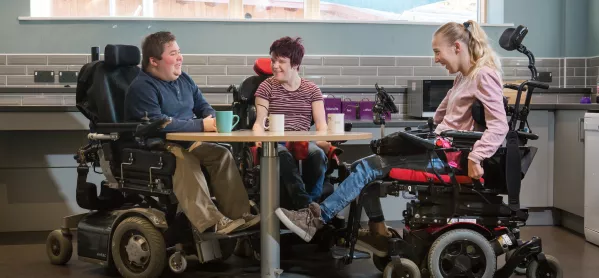
Finding the words to describe the impact that National Star College has on its students’ lives is no easy feat. Ben’s* story does a pretty good job.
Aged 19, Ben, who was a mechanic, crashed his car on the way to work, suffering a significant brain injury. Unable to continue his day-to-day life and live alone, he moved into a specialist residential home and started at National Star College as a day student.
Like many with brain injuries, he suffered from excessive fatigue, the impact of which was massive: his behaviour challenging. Staff recount him holding on to the wheels on his wheelchair for two hours in the car park, refusing to move. Things escalated and it was suggested that he would be better placed in a secure unit.
Opinion: ’SEND has become inefficient and confrontational’
Award-winning: National Star College wins at Tes Fe Awards 2019
2020‘s Tes FE Awards: open for entries
The staff at National Star disagreed. They put a case forward proposing that Ben should move to National Star as a residential student. They recognised that managing the fatigue was crucial, and by being with him 24 hours a day, seven days a week, they could work with him to lessen the grip it had on his life.
They won the case and Ben lived at National Star for three years - where he thrived. He learned to live with peers, to manage his behaviour, and his communication with staff and others improved. This year, staff took him to a bike show at the NEC in Birmingham. It wasn’t easy: he was taken out of the arena whenever he needed to rest and sleep. But nonetheless, he got to attend. Ben is now a permanent resident at the college’s long-term adult provision, and he is enjoying life.
National Star is home to more than 240 students (set over three campuses in Cheltenham, Hereford and Torfaen) and many of them have similar stories to tell. Some have severe autism or muscular diseases, others are non-verbal or have low cognitive function. Some students have been born with their disability, others, like Ben, have had serious accidents which have resulted in life-altering injuries. Most have complex learning difficulties and disabilities.
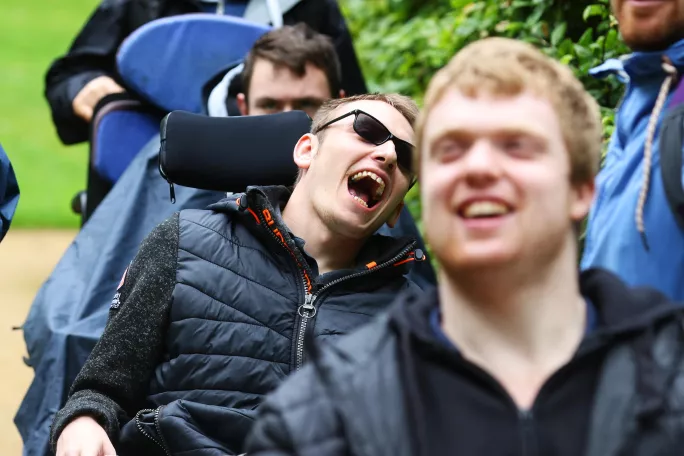
It doesn’t matter how long they stay at the college, whether it’d be months or years - the aim remains the same: to ensure that each and every one of them realises their potential as equal and active citizens in control of their own lives.
National Star is award-winning. This year, they were named Tes FE specialist provision of the year and were awarded the British Council International Award at the AoC Beacon Awards.
A three-pronged approach
Principal Simon Welch says the college is unique in that it offers a three-pronged approach: learners benefit from residential and learning support, a specialised and tailored education, and they also have access to a vast therapeutic team, who offer things like physiotherapy and speech therapy.
“I saw a great example last year. We had a speech and language therapist, working in the swimming pool on a communication technique that they were implementing to support the young person to understand what they needed to do in terms of the exercises in the pool while being taught by a swimming teacher.
“And you think: where else would you see that? One of our technical support team designing a switch, so that a student could access a camera, which means that they could take independent photos as part of the photography session taught by their photography tutor.
“And all of that is because they want to go on and do a photography course after college. That just couldn’t be achieved without the kind of skill set that we’ve got but also the model in which the way we work,” he says.
Peer observations across the disciplines are also common practice. A senior tutor may be observed by a speech and language therapist, who can advise them on their communication. The senior tutor can advise the therapist on about a subject area that they could reinforce and embed within their therapy sessions.
And often, staff will work together in sessions with students. This, Welch says, is an unbelievable way of getting quality out of the training and transfer of skills.
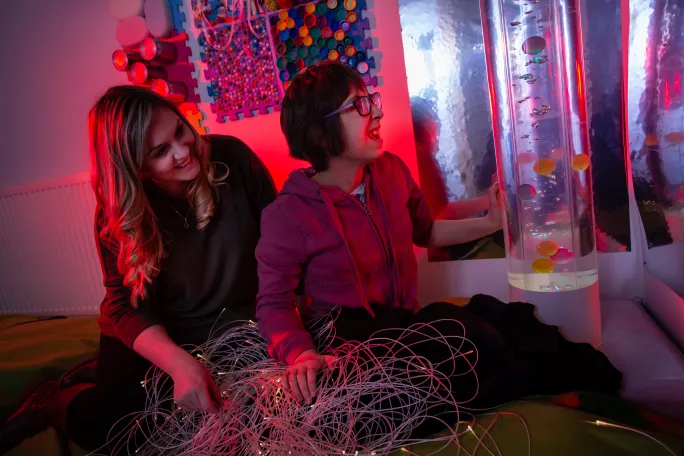
“We can all go and do something theoretically in a CPD session or on a training course, but if you’ve got somebody on the ground who’s applying something with somebody else, and it all done around the person who it’s going to impact, that’s the best opportunity to develop it,” he says.
Culture and character traits
The facilities, as you’d expect, are state of the art. The campus - with so many buildings, paths and green spaces everywhere, it really is very far removed from a traditional college building - is beautiful. Deep in the Gloucestershire countryside, it’s almost tranquil. Everywhere is fully accessible, and students are able to make full use of a theatre, two swimming pools, multiple sensory rooms as well as more traditional classrooms.
But truly, it’s the culture of the place that makes it so special. Staff are smiling, and the college radiates feelings of acceptance, of determination, and of love.
That culture is thanks to management behaviour, says chief executive David Ellis.
“How the managers behave will define the culture. Actually, I think most people you’ve spoken to would say this is a great place to work. It’s got a true feeling of belonging,” he says.
It requires a certain type of teacher to work at National Star, Ellis acknowledges. They need to have particular character traits: patience, kindness, a caring nature - and above all, they need to fit in.
“When you interview you only really ask three questions: can you do it, do you want it, will you fit in, and often that third question is often ignored.
“Where I get most of my assurance about the quality of the provision is the culture because the staff won’t allow it to drop. They are all so proud of what they do,” he says.
Stretching horizons
The dedication of the staff is extraordinary - epitomised by the annual ski trip to Andorra. A college offering a ski trip may not seem extraordinary, but with students who have highly complex needs, it is anything but. Verity Fisher, the college’s head physiotherapist, has led the trip since it began five years ago.
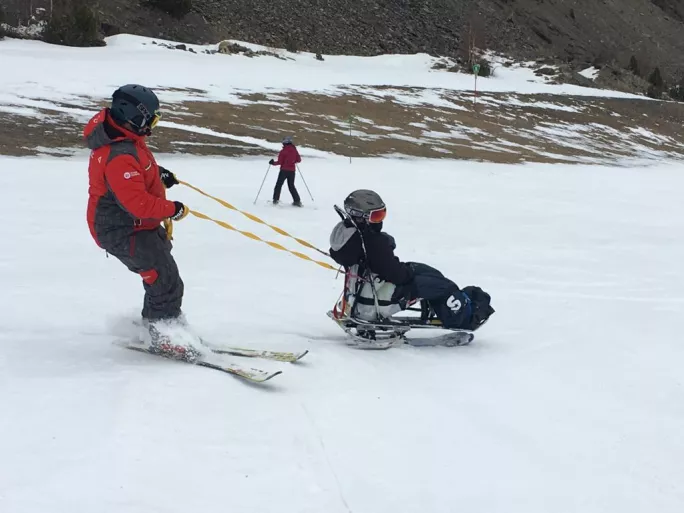
In the first year, seven students were taken to resort in Andorra that had British ski instructors who were specialists in disability. They could all self-transfer, and the goal was that they’d learn to ski just as anyone would. In January 2020, 26 students with everything from full medical needs, to needing one-to-one care, or palliative care conditions, will be flown out across two weeks.
“There are big risks associated with it, but there are managed risks. We are very fortunate that we work with inspiring young people who aren’t defined by their disability, they want to be seen as young people who can lead an active life,” says Fisher.
It’s hard work. Staff are on call throughout the nights, feeding, changing or supporting students. During the day, students need to have a ski instructor and a member of staff who can ski with them at all times. But it is transformative. Some of the students will have never been a plane before, their parents believing that everything that accompanies it - airport security, boarding, the flight itself - is simply unachievable. Then there’s the experience of being in a foreign country, learning to ski and of course, enjoying après ski.
“You can teach a student life skills in different settings, but there’s nothing like going through an airport and speaking to people who the language is different, the food’s a bit different to really embed those skills. You just see a phenomenal change in the students during the trip.
“You see them grow from being the student you knew at college, to a young person who is confident to speak to other people, is aware of risk and who comes back and has a drive to things they never thought would be possible,” Fisher says.
Stretching horizons and fostering a sense of self-belief is at the core of everything National Star does. And although their primary focus is on the individual student, the parents, siblings, grandparents, friends of those students also hugely benefit from that approach.
FestABLE
In 2018, the college created and hosted FestABLE, a festival that brought together young people with disabilities, their families, and others involved in SEND education in the UK. Staff from the Department of Education attended, as did some from Ofsted. There were academics, authors, teachers, parents all giving talks and workshops. A legal surgery was open all day, where families could speak to experts about any issues relating to SEND EHCPs or funding issues. Wheelchair-accessible hot air balloon rides were available, and families could visit immersive sensory spaces.
For the first time on a national scale, it gave young people and their families to ask questions, share their experiences, and have their voices heard. The festival will be held every other year.
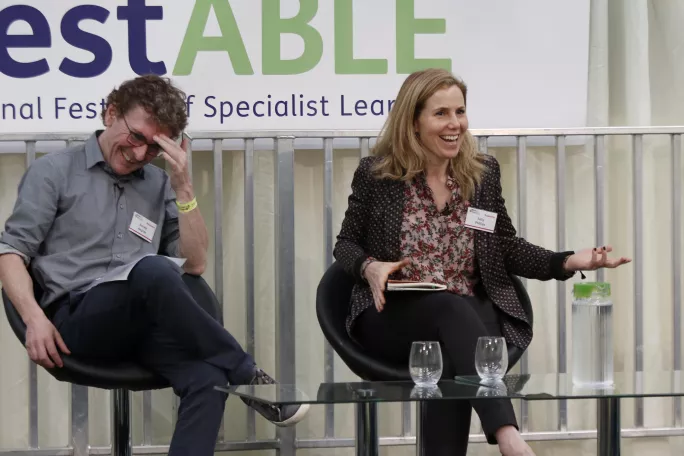
National Star is making its mark internationally, too. Staff are currently working with the Belarusian ministry to develop the country’s care quality regulations, they are sharing their teaching practises in India, they have partnerships in providers in Kenya, Antigua, Finland to name just a few.
“Our vision is a world in which people with disabilities can realise their potential. The word world is there for a reason: it’s not just on a local level,” says David Finch, director of international development.
“We are impacting on the lives of a lot of people in countries where they’re just starting to develop their systems around quality and around education for people with disabilities and making them much more inclusive environment for them to learn.”
As part of the National Star charity, the college is transforming SEND education on so many levels, and in so many places. Their expertise isn’t just benefitting the students they across the three centres in the UK, but as Finch says, worldwide.
But ultimately, when it comes to describing National Star and the work they do, one thought prevails. At National Star, the students don’t live where staff work. The staff work at the students’ home.
And that’s what makes the college award-worthy.
*Not his real name
Register with Tes and you can read two free articles every month plus you'll have access to our range of award-winning newsletters.
Keep reading with our special offer!
You’ve reached your limit of free articles this month.
- Unlimited access to all Tes magazine content
- Save your favourite articles and gift them to your colleagues
- Exclusive subscriber-only stories
- Over 200,000 archived articles
- Unlimited access to all Tes magazine content
- Save your favourite articles and gift them to your colleagues
- Exclusive subscriber-only stories
- Over 200,000 archived articles



